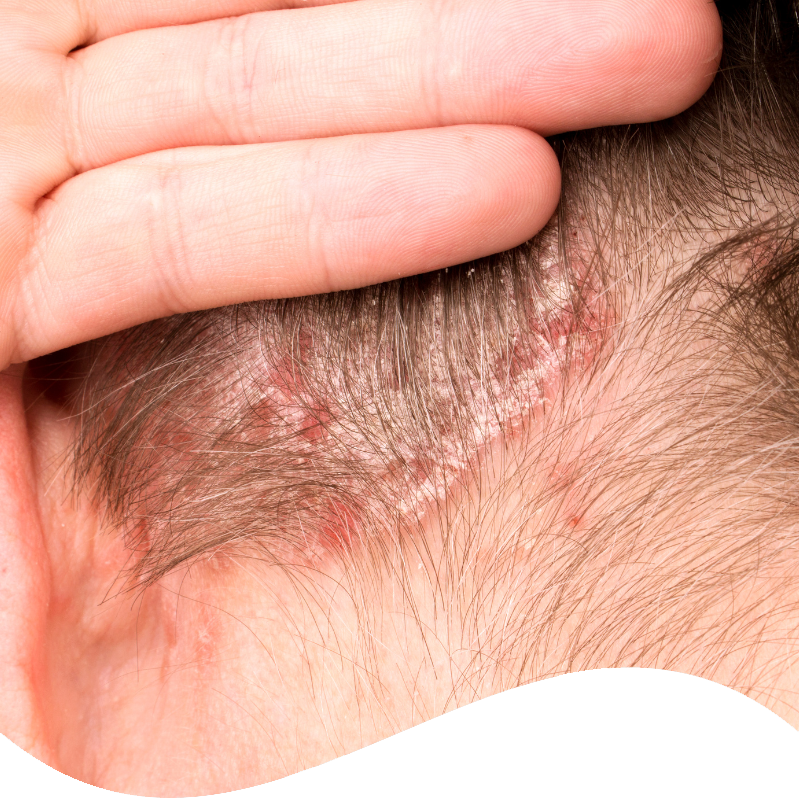Hair and nail conditions
![]()
Dermatologists are trained to assess and diagnose a wide variety of problems that happen to the hair and nails as part of overall skin management. Your hair and nails can be affected by skin conditions that affect the whole body, such as psoriasis, or you may have a problem that is affecting only your hair or nails.

Hair conditions
*We are currently only accepting New Referrals for hair problems for paediatric patients.
What causes it?
There are many skin conditions that affect the skin of the scalp as well as the rest of the body, such as psoriasis and eczema. Hair loss can be caused by infections that are found on the scalp, such as fungal infections. Sores on the scalp can be caused by bacterial infections or impetigo. Autoimmune conditions such as Lupus and Lichen Planus can affect hair growth, leading to thinning or hair loss. Trauma to hair, such as from hair pulling or tight hairstyles, can also lead to hair loss.
What are the symptoms?
Hair problems can lead to your hair falling out, hair thinning, a change in the colour of your hair or an itchy, painful scalp. Hair loss can be sudden or gradual and may affect the whole scalp or just one area. Sometimes, people notice their hair falling out or shedding when it is occurring, whereas other times it is just noticed as thinning.
What are the treatment options?
Treatment choices will depend on the cause. Your dermatologist will ask you questions about your past and current health, and any medications you are on. Your hair and scalp skin will be closely examined and other areas of your skin may be assessed as well. Sometimes, a hair sample will be sent to the laboratory for testing (particularly if a fungal infection is suspected), or a skin biopsy may be suggested. Blood tests may also be requested.
After a thorough assessment, a treatment plan will be developed for you.
Nail conditions
Finger and toenails have an important role in supporting and protecting the tips of each finger and toe. Fingernails help with function, such as scratching an itch or untying a knot! Nail problems can affect people of all ages.
What causes it?
There are many skin conditions that affect nails as well as the skin, such as psoriasis and eczema. Infections can be found in nails, such as toenail fungal infections, or on the skin around the nail, such as paronychia (bacterial infection of the skin fold by the nail). Trauma from nail biting, poorly fitting shoes and injury can all affect nail growth and appearance.
What are the symptoms?
Nails may become discoloured, thickened, ridged or brittle. The nail plate may lift from the edge and splitting may occur. Occasionally, the nail may become an unusual shape.
What are the treatment options?
Treatment choices will depend on the symptoms you are experiencing and the cause of the problem. Good hand and foot care are important, including:
- Soap free washes
- Protective gloves for wet work like washing dishes and when gardening
- Not biting nails or the cuticles
- Not smoking
- Moisturising hands frequently (and moisturising nails at the same time)
- Wearing well-fitting shoes that are not tight over the toes.
What to expect at your appointment
You will be asked questions about your past and current health, and any medications you are on. Your nails will be closely examined and other areas of your skin may be assessed as well. Sometimes a sample of the nail will be sent to the laboratory for testing, particularly if a fungal infection is suspected. Sometimes, blood tests will be requested.
A detailed treatment plan will be developed depending on the diagnosis and how the nail issues are affecting you.
Book Now
Due to current demand, we have a waiting time of 4 to 7 months for new patients with Dr Stephanie Weston.
